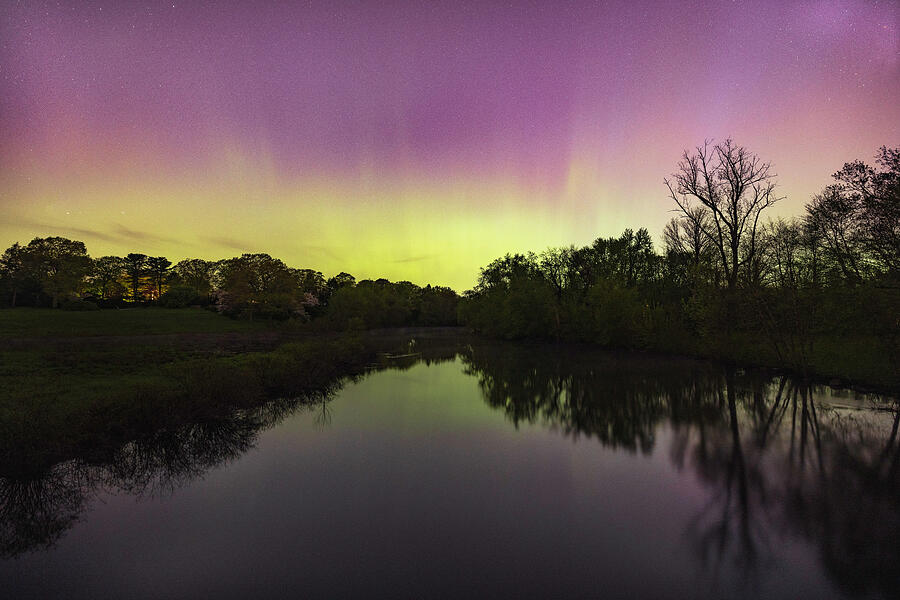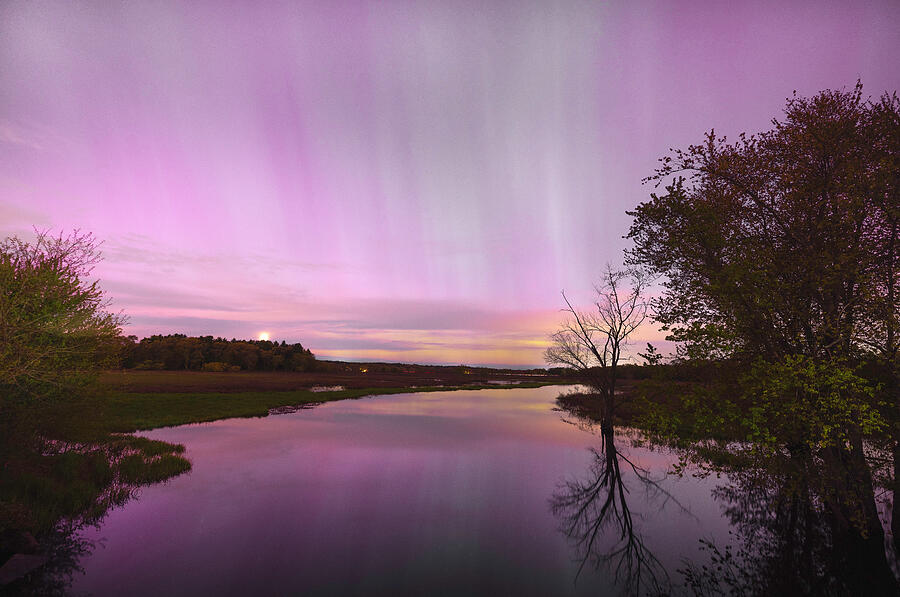The Enchanting Elusive: Aurora Borealis in Massachusetts
Related Articles: The Enchanting Elusive: Aurora Borealis in Massachusetts
Introduction
In this auspicious occasion, we are delighted to delve into the intriguing topic related to The Enchanting Elusive: Aurora Borealis in Massachusetts. Let’s weave interesting information and offer fresh perspectives to the readers.
Table of Content
The Enchanting Elusive: Aurora Borealis in Massachusetts

While the Aurora Borealis, or Northern Lights, is a spectacle most commonly associated with high-latitude regions like Alaska and Canada, it is not entirely out of reach for those residing in Massachusetts. While sightings are rare and often fleeting, the possibility of witnessing this celestial dance does exist, albeit under specific, and often challenging, circumstances.
Understanding the Aurora Borealis
The Aurora Borealis is a natural light display in the sky, predominantly seen in the high-latitude regions (around the Arctic and Antarctic). It is caused by the interaction of charged particles from the Sun (the solar wind) with the Earth’s atmosphere.
- Solar Wind: The Sun constantly releases a stream of charged particles, known as the solar wind. This wind consists of protons and electrons, which travel at high speeds through space.
- Earth’s Magnetic Field: Earth has a magnetic field that acts as a shield, deflecting most of the solar wind. However, some particles can penetrate this shield, particularly near the poles where the magnetic field lines are weaker.
- Atmospheric Interaction: When these charged particles enter the Earth’s atmosphere, they collide with atoms and molecules in the air, exciting them. As these excited atoms return to their ground state, they release energy in the form of light, creating the vibrant auroral displays.
Why Aurora Borealis in Massachusetts is Rare
Massachusetts, located at a relatively low latitude, sits well below the auroral oval, the region where the Aurora Borealis is most frequently observed. The auroral oval is a ring-shaped zone around the magnetic poles where the Earth’s magnetic field lines converge, allowing charged particles to enter the atmosphere more readily.
For the Aurora Borealis to be visible in Massachusetts, a series of factors must align:
- Geomagnetic Storms: These storms are periods of heightened solar activity, resulting in a surge of charged particles from the Sun. Strong geomagnetic storms can extend the auroral oval southward, making it possible to see the Aurora Borealis at lower latitudes.
- Clear Dark Skies: The Aurora Borealis is a faint light display, requiring clear skies with minimal light pollution for optimal viewing.
- Ideal Timing: The Aurora Borealis is more likely to be visible during the winter months when the nights are longer and darker.
Historical Sightings and Recent Observations
While not a regular occurrence, there have been documented instances of Aurora Borealis sightings in Massachusetts throughout history.
- 1859 Carrington Event: This powerful solar storm, one of the most intense on record, caused widespread auroral displays across the globe, including visible sightings in Massachusetts.
- Recent Sightings: In recent years, there have been occasional reports of Aurora Borealis sightings in Massachusetts, particularly during periods of strong geomagnetic activity. These sightings are usually faint and brief, but they highlight the potential for observing this celestial phenomenon in the state.
Observing the Aurora Borealis in Massachusetts
While the chances of seeing the Aurora Borealis in Massachusetts are slim, there are ways to increase your chances:
- Follow Space Weather Forecasts: Websites like the Space Weather Prediction Center (SWPC) provide real-time updates on solar activity and geomagnetic conditions.
- Seek Out Dark Skies: Head away from city lights to locations with minimal light pollution, such as rural areas or national parks.
- Be Patient: The Aurora Borealis can be unpredictable, so be prepared to spend time waiting for a potential sighting.
Related Searches
1. Aurora Borealis Forecast: Several websites and apps provide forecasts for auroral activity, allowing you to track the likelihood of seeing the Aurora Borealis in Massachusetts. These forecasts utilize real-time data from satellites and ground-based observatories to predict auroral activity.
2. Aurora Borealis Photography Tips: Capturing the Aurora Borealis requires specific techniques and settings for optimal results. Online resources offer tips on camera settings, composition, and post-processing techniques for photographing the Aurora Borealis.
3. Best Places to See the Aurora Borealis in Massachusetts: While sightings are rare, certain locations in Massachusetts offer slightly better chances due to their darker skies and remoteness. These locations may include state parks, national forests, or rural areas with limited light pollution.
4. Aurora Borealis Myths and Legends: The Aurora Borealis has inspired numerous myths and legends across cultures. Exploring these stories can provide a deeper understanding of the historical and cultural significance of the Aurora Borealis.
5. The Science Behind the Aurora Borealis: Understanding the scientific processes behind the Aurora Borealis can enhance your appreciation for this natural phenomenon. Scientific resources delve into the interactions between the solar wind, Earth’s magnetic field, and atmospheric particles.
6. Aurora Borealis Viewing Tips: Tips for maximizing your chances of seeing the Aurora Borealis in Massachusetts include observing during periods of high geomagnetic activity, finding locations with dark skies, and being patient.
7. Aurora Borealis History and Culture: The Aurora Borealis has played a significant role in the history and culture of northern communities. Exploring these cultural connections can provide valuable insights into the human relationship with this celestial phenomenon.
8. Aurora Borealis in Other Parts of the World: While Massachusetts offers limited opportunities for observing the Aurora Borealis, exploring the phenomenon in other parts of the world can offer a broader perspective on the global distribution and significance of this natural light display.
FAQs
1. When is the best time to see the Aurora Borealis in Massachusetts?
The best time to see the Aurora Borealis in Massachusetts is during the winter months, from late October to early April, when the nights are longer and darker. However, sightings are rare and require specific conditions, including strong geomagnetic storms.
2. How can I predict when the Aurora Borealis might be visible in Massachusetts?
The Space Weather Prediction Center (SWPC) provides real-time updates on solar activity and geomagnetic conditions. Monitor their website or app for forecasts of geomagnetic storms, which can increase the chances of seeing the Aurora Borealis at lower latitudes.
3. Where are the best places to see the Aurora Borealis in Massachusetts?
While sightings are rare, locations with dark skies and minimal light pollution offer slightly better chances. Consider heading to state parks, national forests, or rural areas with limited light pollution.
4. What are the chances of seeing the Aurora Borealis in Massachusetts?
The chances of seeing the Aurora Borealis in Massachusetts are slim, as the state is located well below the auroral oval. However, during periods of intense solar activity, the auroral oval can extend southward, making sightings possible, although brief and faint.
5. Is it possible to see the Aurora Borealis in Massachusetts during the summer?
While it is technically possible to see the Aurora Borealis in Massachusetts during the summer, it is highly unlikely. The shorter nights and increased sunlight make it challenging to observe the faint auroral display.
Tips for Observing the Aurora Borealis in Massachusetts
- Check Space Weather Forecasts: Stay updated on solar activity and geomagnetic conditions to increase your chances of seeing the Aurora Borealis.
- Find a Location with Dark Skies: Head away from city lights to locations with minimal light pollution for optimal viewing.
- Be Patient: The Aurora Borealis can be unpredictable, so be prepared to spend time waiting for a potential sighting.
- Dress Warmly: Even in the summer months, nighttime temperatures can drop significantly, so dress appropriately for the weather conditions.
- Bring a Red Flashlight: Red light does not interfere with night vision, making it ideal for navigating in the dark.
- Avoid Using White Lights: White lights can interfere with your night vision, making it harder to see the Aurora Borealis.
- Use a Camera with a Wide-Angle Lens: A wide-angle lens allows you to capture more of the sky and increase your chances of capturing the Aurora Borealis.
- Set Your Camera to a Long Exposure: To capture the faint auroral light, use a long exposure setting on your camera.
- Experiment with Different ISO Settings: Adjust the ISO setting on your camera to find the optimal balance between brightness and noise.
Conclusion
While the Aurora Borealis is a rare sight in Massachusetts, the possibility of witnessing this celestial phenomenon exists, particularly during periods of strong geomagnetic activity. By understanding the factors that influence auroral visibility, following space weather forecasts, and seeking out dark skies, those residing in Massachusetts can increase their chances of experiencing this captivating natural light display. Though elusive, the potential for observing the Aurora Borealis in Massachusetts adds a layer of excitement and wonder to the night sky, reminding us of the awe-inspiring beauty and power of the cosmos.








Closure
Thus, we hope this article has provided valuable insights into The Enchanting Elusive: Aurora Borealis in Massachusetts. We thank you for taking the time to read this article. See you in our next article!

